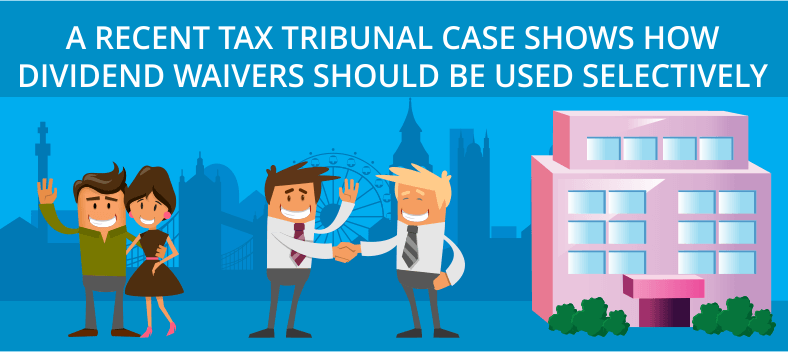A recent case has highlighted the potential hazard of dividend waivers as a means of saving tax between civil partners or married couples. That is not to say this strategy is never acceptable, but that dividend waivers should be used with great care because they can be viewed by the tax authorities as "income shifting", which under settlements legislation (part of governments’ anti-avoidance legislation) can place you on the wrong side of the law.
Why waive dividends?
Some owner-managers may consider shifting income from themselves (as higher rate tax payers) to their spouse (as lower rate tax payers) using a dividend waiver by the higher rate tax payer.

Why not waive dividends?
A recent tribunal decision held that dividend waivers made in favour of shareholders’ wives were settlements and did not fall within "the outright gifts to spouse" exception.
How are dividends taxed?
- Dividends are subject to income tax, regardless whether the dividend is revenue or capital.
- UK taxpayers liable to income tax at the basic rate are taxed on the dividend at the rate of 10%.
- UK taxpayers liable to income tax at the higher rate are taxed at the rate of 32.5% on the dividend.
What is settlements legislation?
Settlements legislation is intended to prevent an individual (the settlor) from gaining a tax advantage by making arrangements that divert his income to another person who is liable to tax at a lower rate or is not liable to tax. Where the settlements legislation applies to a dividend waiver, all of the income waived is treated as though it was the settlor’s.
What happened in this particular case?
Mr. D. and Mr. M. owned 40 ordinary shares of the company each and their wives owned ten shares each. On 6 April 2009, the major shareholders signed deeds of waiver that waived their entitlement to dividends for one day; later that day the company declared an interim dividend of £3,200 per ordinary share in respect of the accounting period ended 31/3/2010. Thus, on that date, the wives received dividends of £32,000 each and the husbands received nothing.
Two days later, the wives signed deeds of waiver that waived their entitlement to dividends for one day; later that day the company declared an interim dividend of £825 per ordinary share in respect of the accounting period ended 31 March 2010. Thus, on that date, the husbands received dividends of £33,000 each and the wives received nothing.
What was the outcome for the shareholders?
For the year ended 31 March 2010, Mr. D. and Mr. M. each received £33,000 in dividends and Mrs. D. and Mrs. M. each received £32,000.
What did HMRC think of this?
HMRC carried out a review of the dividend history for the company. They noticed that there was a regular pattern, since 2001 when the wives became shareholders, whereby the company was declaring and waiving dividends so that the major shareholders (the husbands) and minor shareholders (their spouses) received roughly equal amounts of dividends.
HMRC argued that these transactions represented an "arrangement" that allowed the husbands to take advantage of their spouses unused basic-rate tax and thus allowed them to avoid paying higher rate tax on the dividends. In addition, HMRC drew attention to the fact that the company had insufficient distributable profits to pay the dividends declared unless the dividend waivers were enacted.
A commercial reason?
Mr. D. and Mr. M. argued that the dividend waivers were commercially motivated: they had enabled the company to retain funds so that the company could purchase its own freehold property. HMRC would have none of it: if the company had wanted to retain reserves, it could have voted smaller dividends in proportion to actual shareholdings.
Tribunal decision
The First-tier Tribunal found in favour of HMRC that, regardless of the amount of distributable reserves, the purpose of the arrangement was to equalise incomes and reduce tax.
Outcome
The settlement ruled that the husbands were taxable on their wives’ dividends.
Some advice: how to use dividend waivers
The tribunal did note that the result of this case does not mean that all dividend waivers should be treated as a settlement for income tax purposes. However, it is important to ensure that:
- There is a genuine commercial reason for waiving dividends
- There is evidence to support this commercial reason, so that it is not seen as either a "bounty" or a gift out of income.
- Make sure the dividend declared per share times the number of shares in issue does not exceed the amount of the company’s distributable reserves.
- Do not make a pattern of using dividend waivers.
- Make this a tactic used rarely and selectively and always seek advice before you do so.
Any questions? Schedule a call with one of our experts.








